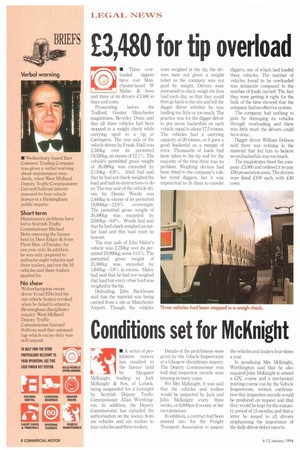£3,480 for tip overload
Page 10

If you've noticed an error in this article please click here to report it so we can fix it.
• Three over loaded tippers have cost Manchester-based W Maher & Sons and three of its drivers £3,480 in fines and costs Prosecuting before the Trafford, Greater Manchester magistrates, Beverley Dunn said that all three vehicles had been stopped in a weight check while carrying spoil to a tip at Carrington. The rear axle of the vehicle driven by Frank Abell was 2,340kg over its permitted 19,320kg, an excess of 12.1° o. The vehicle's permitted gross weight of 30,490kg was exceeded by 2,110kg--6.9%. Abell had said that he had not check-weighed the load and had no instructions to do so. The rear axle of the vehicle driven by Dennis Woods was 2,440kg in excess of its permitted 18,800kg-12.9% overweight. The permitted gross weight of 30,490kg was exceeded by 2,040kg-6.6%. Woods had said that he had check-weighed an earher load and this load must be heavier.
The rear axle of John Maloy's vehicle was 2,750kg over its permitted 19,000kg, some 14.5%. The Permitted gross weight of 31,000kg was exceeded by 1,840kg-5.9% in excess. Maloy had said that he had not weighed that load but every other load was weighed at the tip.
Defending, John Backhouse said that the material was being curried from a site at Manchester Airport. Though the vehicles were weighed at the tip, the drivers were not given a weight ticket as the company was not paid by weight. Drivers were instructed to check-weigh the first load each day, so that they could then go back to the site and tell the digger driver whether he was loading too little or too much. The practice was for the digger driver to put seven bucketfuls on each vehicle, equal to about 17.5 tonnes. The vehicles had a carrying capacity of 20 tonnes, so it gave a good bucketful as a margin of error. Thousands of loads had been taken to the tip and for the majority of the time there was no problem. Weighing devices had been fitted to the company's rubber t3..rred diggers, but it was impractical to fit them to crawler diggers, one of which had loaded these vehicles. The number of vehicles found to be overloaded was miniscule compared to the number of loads carried. The fact they were getting it right for the bulk of the time showed that the company had an effective system.
The company had nothing to gain by damaging its vehicles through overloading and there was little more the drivers could have done.
Digger driver William Dobson said there was nothing in the material that led him to believe seven bucketfuls was too much.
The magistrates fined the company £3,000 and ordered it to pay .C60 prosecution casts The drivers were fined £100 each, with £40 costs.








































































